Anna McGrath
Writer & Director
A Playwright tracing the tension and tenderness between generations, Anna McGrath explores diaspora, identity, and performance with heart, humour, and a deep eye for the unsaid.
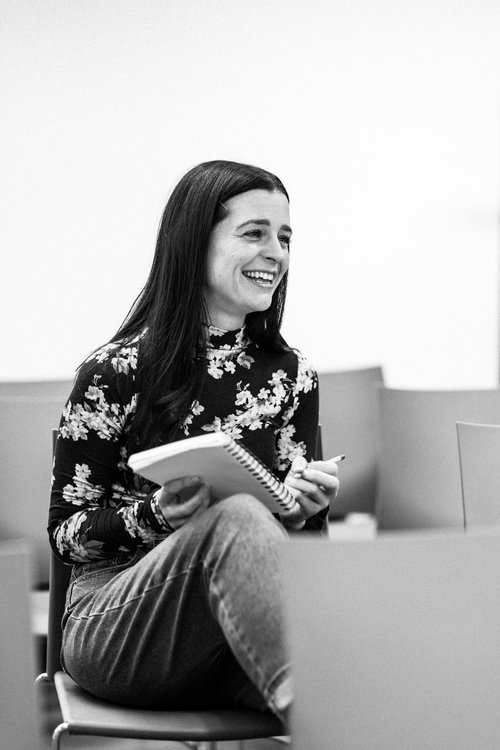
“I was just down in Bob and Berts doing my redraft of Feis. I had notes on it last week, and I’ve just made some tweaks,” says playwright Anna McGrath. “I’ve been doing it every day for a couple of hours and I’ve finally worked through some of it. Feeling quite relieved about that.”
“My schedule depends on the project, and it depends on the availability of childcare in my own life,” she adds. “Feis, that I’ve working on currently, I’m trying to make sure that it makes sense with the characters and tightening up the story.” Anna’s production of Feis will be presented as part of the autumn season at A Play, A Pie and A Pint, Oran Mor Glasgow – a lunchtime theatre that is renowned for new writing and launching the careers of emerging playwrights.
It will also be co presented at The Traverse Theatre Edinburgh “I’m thrilled to have my play being produced by two theatres that put so much precedence on new writing and giving emerging playwrights a platform.
Irish Dancing and Diaspora
“I’m really interested in the diaspora community… the Irish community living abroad. That’s something that I’m really interested in because that’s really linked to my upbringing living in Birmingham and spending a lot of my childhood travelling back and forth on holidays and extended breaks.”
Feis, set in the UK and rooted in Irish diaspora communities, centres on Irish dancing both as a performance world and as a site of cultural identity. “I used to Irish dance as a child myself. And I think it’s a really strong community of people that are representing your Irishness when you’re not in Ireland.”
The inspiration came partly from a real-world controversy. “There was a documentary about a cheating scandal that happened in the Irish dancing community a few years ago…” It was, she says, a moment that exposed how “fragile” the system was – and how deeply Irish dancing matters to Irish communities globally.
“That was an early inspiration for the play, it really lit the fuse for me,” she explains. Still, Feis is not about the scandal. “It’s really about relationships with identity, with family and with a love of Irish dancing. The scandal is relevant – let’s call it thematic in my play – but not the focus.”
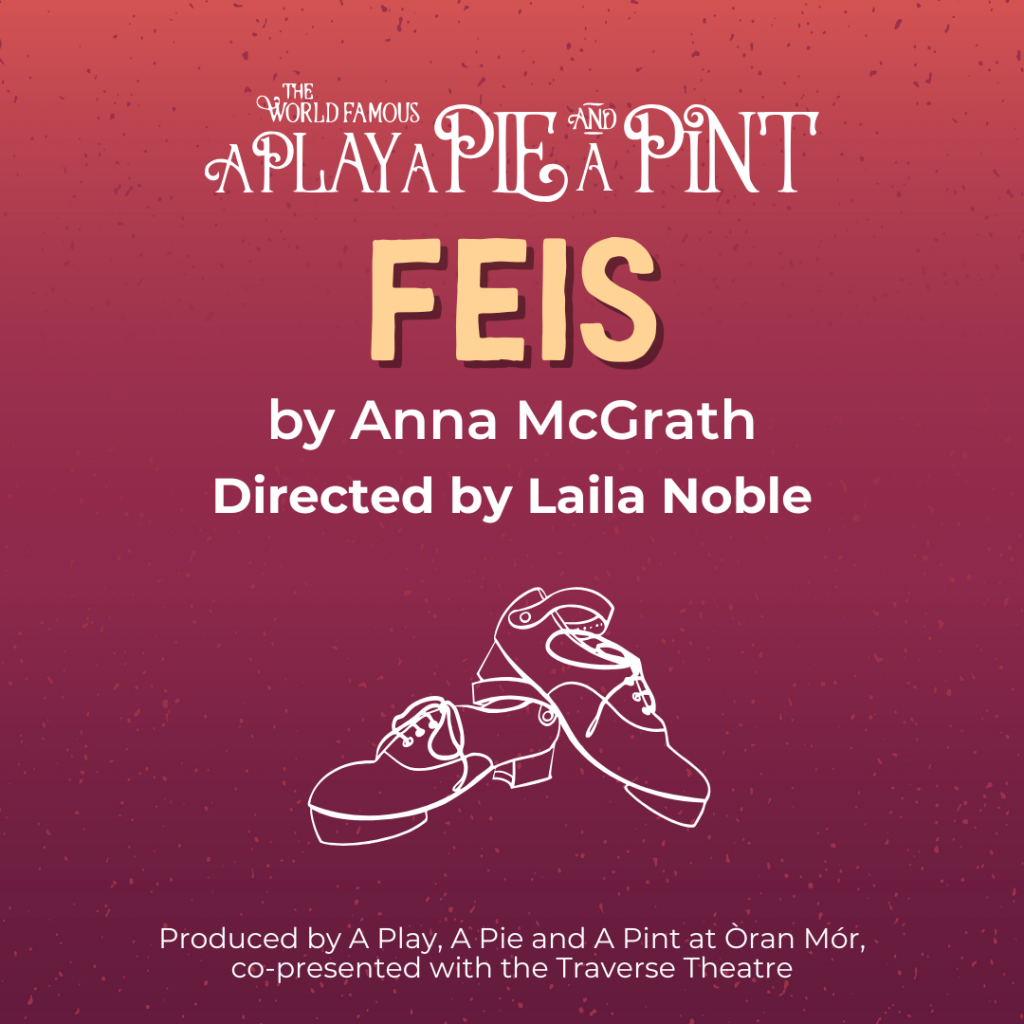
Three Generations, One School
At its heart, Feis is about intergenerational identity. “It’s about a grandmother, her daughter who runs the Irish dance school, and then her daughter.” The central character, Deirdre, will go to great lengths to keep the McGuire School of Irish Dance afloat – even at the cost of her relationship with her own daughter.
“I’m really interested in relationships between the female familial characters, and the differences in the generations between grandmothers to their daughters, and to the daughters after them.” In Irish diaspora communities, accents and experiences shift between generations.
But Irish identity doesn’t necessarily weaken over time. For many, McGrath says, that sense of cultural identity becomes more urgent abroad. “It’s symbolic – just like sport and music – it’s a symbol of your Irishness.”
Last Light and the Sea
McGrath’s interest in generational tension also runs through Last Light, a play about respect, memory, and the sea. “It’s about how we approach things. So in that context, it’s about how the characters approach their relationship with the sea and the fishing community.”
The play follows multiple generations living in Dunbar. Some, like Sarah, fundraise for the RNLI after losing a relative at sea. Others, like Fionn, chase TikTok fame by tombstoning off dangerous cliffs. “He’s trying to show off… and it’s about how he doesn’t really understand what the big deal is.”
“There’s a boy called Declan who’s really respectful… he goes out fishing with his grandfather.” Then there’s Douglas, that grandfather: “he’s always out there fundraising for the RNLI, but gets frustrated that young people don’t seem to understand.”
McGrath says the RNLI’s presence in Dunbar is huge: “people volunteering and putting their lives at risk to do that… it’s a thing that weighs heavily on that community because it has saved lots of people’s lives.”

Writing for Young People
While she writes plays for adult audiences – with “dark comedy and really strong, provocative themes” – McGrath is equally passionate about writing for children. “My whole other agenda as a playwright is writing for young people… I think theatre in schools could be a lot better.”
Access is key: “a lot of children don’t get to see the theater through a variety of reasons, often socioeconomic… it’s lovely to go to a theatre, but with the reality of funding for schools, it’s much more manageable to get a play into a school.”
She directs young people regularly and draws from this work in her writing. “You need to care about your characters… children really respond to comedy and heartwarming characters.” Though their interests may differ, they still know when a story rings true. “A good story is still a good story. And children recognize that.”
Meaning and Subtext
For McGrath, the ultimate aim is resonance: “My ideal audience member would be somebody sat in the audience and they’re laughing, but they’re also not sure whether they want to cry and both responses can work alongside one another.”
She wants the audience to be engaged, not spoon-fed. “Don’t give them everything at once. The audience don’t want to have it handed on a plate. Make them work for it.” Her acting background helps her shape dialogue and drama. “I can picture myself doing that, you know, reading the dialogue in a dramatic way.”
Much of her work is grounded in the dynamics of family. “There’s usually some element of conflict somewhere, because everybody has their own bias or perspective. But also we’re loaded with this kind of feelings around family links. People have perceptions of who you are and how you’re perceived within a family. I think that’s interesting, especially with intergenerational relationships, every individual sees everyone else through a different lens and then that creates its own drama in itself. The different roles that people play within their own family.”
Loneliness is another recurring theme. “It’s in Feis, actually… you could be in a room, but you’re acting like strangers.” The play is about those things left unsaid. “What’s not being said here? And then eventually it might come out and it just sparks a fire, which I enjoy.”

Space, Place, and Performance
McGrath embraces unconventional theatre spaces in both her professional and educational work. “I quite enjoy interesting spaces and making unconventional spaces into theatrical spaces. I do that a lot in the school that I work in. They don’t have a theatre, so I transform a lot of spaces into theatres.” She once staged a Shakespeare performance across multiple outdoor sites: “I did a whole Shakespeare using a big garden at my school, and I did a whole Shakespearean roving performance.”
One memorable staging involved blending The Tempest, Midsummer Night’s Dream, and Romeo and Juliet in a single outdoor production. “The play starts off at the swimming pool… we had all the children diving into the pool in the scene… and then the heavens opened and there was a storm. I was like, this is a Tempest.” While the weather disrupted the rest of the play, it brought an intense theatrical realism to the storm scene. “It was really theatrical.”
She continues to be inspired by space and place. “I like redefining spaces and creating a space where you can make anywhere performative very quickly with the right setting, in the right performance.” And she’s not finished: “I really want to do a play in a boat. I want to get something out at sea. Or in a dock or a harbour.”
Looking Ahead
Beyond theatre, McGrath is now working on a TV Drama pilot with her friend Lauren Hurwood, a recent graduate of the Channel 4 TV Writer’s Programme. “I’m really enjoying the collaborative process and I’m excited to pitch our screenplay to producers soon”
Whether writing for young audiences or tackling the intricacies of diaspora, identity, and loss, Anna McGrath keeps circling the same human truths: what we pass down, what we hold back, and what we fight to keep alive.
Find out about Anna’s work via her website: annateresamcgrath.com
The Latest Articles

Inni-K on Still A Day: Genuine Irish Songwriting
In the aftermath of touring Still A Day, the singer, composer, and multi-instrumentalist considers music, nature, and what remains once the movement stops.
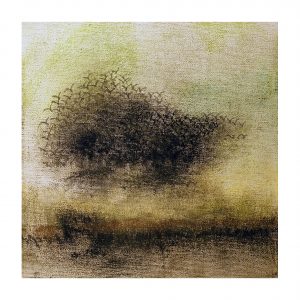
Bob Speers and the Quiet Magic of Ireland’s Bogs
In a room filled with timber, peat, and light, artworks hung on walls are more like fragments of the land itself – weathered, breathing, and alive with memory.
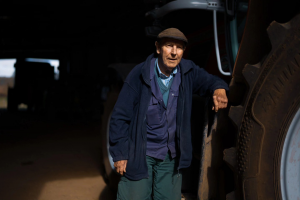
Hernan Farias on Light, Connection and Creative Growth
From the Classroom to the Camera – charting his shift from teaching English in Chile to full-time photography in Northern Ireland.

The Colour & Spirit of Time: Tricia Kelly’s Journey with Ócar
Exploring how sixty million years of volcanic fire, weather, and transformation created the red ochre that now colours Tricia’s life and work.
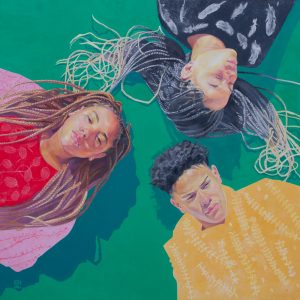
Faith and Colour: The Genuine Art of Beverley Healy
In her imaginative work, paint becomes prayer – a meditation on trust, surrender, and creation, where colour and stillness meet to form something transcendent.

Ruairi Mooney on Creativity, Practice & the Search for Authentic Art
From the North Coast to the Canvas: a journey of resilience, daily practice, and the slow discovery of an authentic artistic voice.
